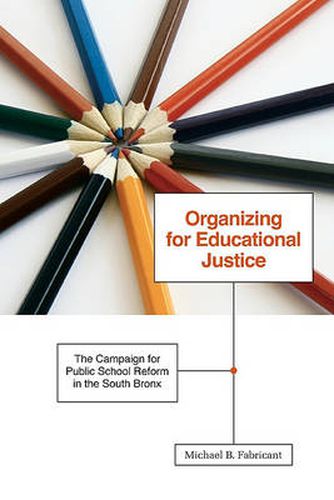Readings Newsletter
Become a Readings Member to make your shopping experience even easier.
Sign in or sign up for free!
You’re not far away from qualifying for FREE standard shipping within Australia
You’ve qualified for FREE standard shipping within Australia
The cart is loading…






Since the 1980s, strategies for improving public education in America have focused on either competition through voucher programs and charter schools or standardization as enacted into federal law through No Child Left Behind. These reforms, however, have failed to narrow the performance gap between poor urban students and other children. In response, parents have begun to organize local campaigns to strengthen the public schools in their communities. One of the most original, successful, and influential of these parent-led campaigns has been the Community Collaborative to Improve District 9 (CC9), a consortium of six neighborhood-based groups in the Bronx. In Organizing for Educational Justice, Michael B. Fabricant tells the story of CC9 from its origins in 1995 as a small group of concerned parents to the citywide application of its reform agenda–concentrating on targeted investment in the development of teacher capacity–ten years later. Drawing on in-depth interviews with participants, analysis of qualitative data, and access to meetings and archives, Fabricant evaluates CC9’s innovative approach to organizing and collaboration with other stakeholders, including the United Federation of Teachers, the NYC Department of Education, neighborhood nonprofits, and city colleges and universities. Situating this case within a wider exploration of parent participation in educational reform, Fabricant explains why CC9 succeeded and other parent-led movements did not. He also examines the ways in which the movement effectively empowered parents by rigorously ensuring a democratic process in making decisions and, more broadly, an inclusive organizational culture. As urban parents across America search for ways to hold public schools accountable for their failures, this book shows how the success of the CC9 experience can be replicated elsewhere around the country.
$9.00 standard shipping within Australia
FREE standard shipping within Australia for orders over $100.00
Express & International shipping calculated at checkout
Since the 1980s, strategies for improving public education in America have focused on either competition through voucher programs and charter schools or standardization as enacted into federal law through No Child Left Behind. These reforms, however, have failed to narrow the performance gap between poor urban students and other children. In response, parents have begun to organize local campaigns to strengthen the public schools in their communities. One of the most original, successful, and influential of these parent-led campaigns has been the Community Collaborative to Improve District 9 (CC9), a consortium of six neighborhood-based groups in the Bronx. In Organizing for Educational Justice, Michael B. Fabricant tells the story of CC9 from its origins in 1995 as a small group of concerned parents to the citywide application of its reform agenda–concentrating on targeted investment in the development of teacher capacity–ten years later. Drawing on in-depth interviews with participants, analysis of qualitative data, and access to meetings and archives, Fabricant evaluates CC9’s innovative approach to organizing and collaboration with other stakeholders, including the United Federation of Teachers, the NYC Department of Education, neighborhood nonprofits, and city colleges and universities. Situating this case within a wider exploration of parent participation in educational reform, Fabricant explains why CC9 succeeded and other parent-led movements did not. He also examines the ways in which the movement effectively empowered parents by rigorously ensuring a democratic process in making decisions and, more broadly, an inclusive organizational culture. As urban parents across America search for ways to hold public schools accountable for their failures, this book shows how the success of the CC9 experience can be replicated elsewhere around the country.